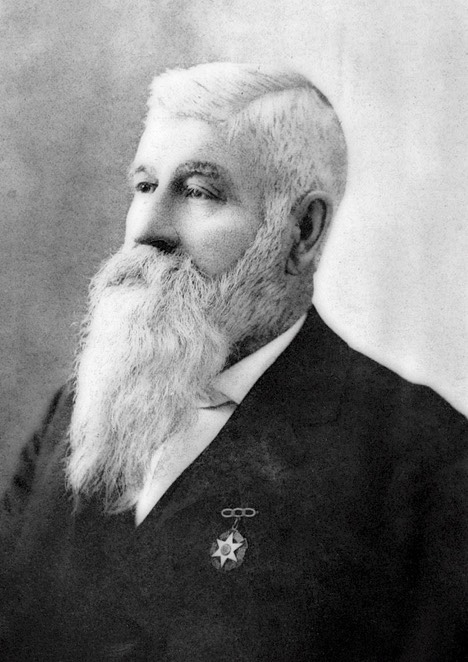
Arriving in Belleville in 1871, Isaac O. Savage just missed being an eyewitness to tumultuous times along the Kansas frontier. Nonetheless he probably did more to preserve early accounts of the settlement of Republic County than any other writer, producing his first edition of the history of the county in 1883.
Savage had served as Republic County Treasurer, a member of the Kansas Board of Agriculture, and State Senator for the 22nd District by the time he had updated his history book for a new century. In the spring of 1902 the Governor of Kansas, the Secretary of the Kansas State Historical Society, and anonymous subscribers to the Belleville Telescope effusively endorsed Mr. Savage’s latest volume.
The subscriber was quoted as say, “Your History is all right. I read it with about the same eagerness that a nearly famished man devours food.”
It was a marked contrast to the treatment Savage would receive from another Telescope subscriber toward the end of that year.
As secretary of the Corn Jubilee, an autumnal celebration later known as the Republic County Fair (The Largest Free Fair in North-Central Kansas!), Savage unwisely penned a brief explanation for an apparent discrepancy about the awarding of a prize for the best loaf of bread submitted by a lady.
A mistake was made through inadvertence on the part of somebody in regard to 1st premium on bread by lady, committee awarding 1st to Mrs. L. D. Speenburg of Bellieville city. Later Mrs. John Mosshart of Rose Creek claims the same premium both of which have been paid and which one had the best bread will probably never be definitely ascertained but both must have been good.
I. O. Savage, Secretary.
If Savage had hoped to douse any smoldering resentment over the affair with a diplomatic but playful retelling of the event, thereby laying an inconsequential matter to rest, the hope was quickly dashed. With a few unwisely-chosen words he had simply fanned the flames.
In reply to the Savage article of last week in which the writer stated that Mrs. L. D. Speenburg was awarded the first premium on bread and that afterward I called and claimed the premium and that both of of us were paid the dollar though only one dollar had been offered by the association, will say that I was awarded the first premium and the blue ribbon was attached to the bread which I baked and which was entered in my name. I still have the ribbon and can produce a half dozen witnesses to prove that the blue ribbon was placed on the loaf of bread which I had on exhibition.
Mrs. Speenburg obtained the second premium on bread and still has the red ribbon to show for it. She does not claim the first premium and never did.
I cared nothing about the dollar as I did not need it. But I do not like to be charged with collecting a premium under false pretenses. Had the secretary investigated the matter he would have found that I honestly obtained the premium and he would have saved himself the humiliation of making so many blunders.
Mrs. John Mosshart.
While men did submit entries for corn, honey, jelly and pickles - butter and baked goods seem to have been the domain of the distaff side. To encourage entries from novices, there were, as the article suggests, separate categories for bread submitted “by girl,” and “by lady.” Then as now, pontificating about the outcome was generally left to men, who really should know better. In this case, Mrs. Mosshart seems to have had the last word on the matter of who had rightfully won the blue ribbon for the best loaf of bread in Republic County, Kansas, in 1902.
Isaac Savage was often called upon to eulogize a fallen neighbor, as he did in 1908 when another member of the International Order of Odd Fellows, Rasmus Rimol, died after a long ordeal with cancer, which he met with stoic grace. “Who knows who will be the next brother to follow,” Savage asked the assembled mourners at the Norway cemetery.
His rhetorical question was swiftly answered when Mr. Savage collapsed in front of the Rimol house while waiting for a carriage to convey him home, dying almost instantaneously.